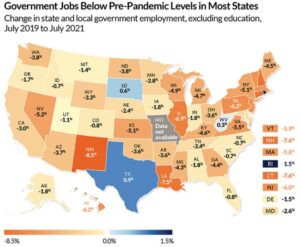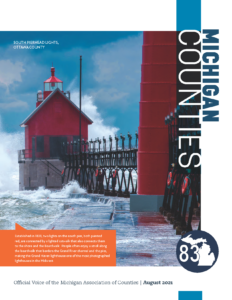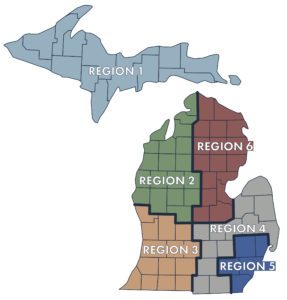Conference draws more than 300 to Mackinac Island; President Kuyers urges unity
 More than 300 county leaders from across Michigan converged on Mackinac Island this week for the 2021 Michigan Counties Annual Conference, which culminated with the swearing in of Ottawa Commissioner Phil Kuyers as MAC Board president.
More than 300 county leaders from across Michigan converged on Mackinac Island this week for the 2021 Michigan Counties Annual Conference, which culminated with the swearing in of Ottawa Commissioner Phil Kuyers as MAC Board president.
The conference, which was held at the Grand Hotel Sept. 26-28, featured plenary sessions, policy breakouts and the MAC Annual Business Meeting, where commissioners approved policy platforms for the 2021-22 year.
Kuyers, who is starting his third term on the MAC Board, is the 113th person to hold the president’s position.
In his speech after taking the oath on Monday, Sept. 27, Kuyers pledged to “raise up MAC as an example of unity, of bipartisanship, of civility and of common sense” in a time of controversy and high passions.
“You are here tonight and at this conference because you believe in the value of MAC. I urge you to lean on this organization like you never have before. Our comfort zone is gone, another victim of the pandemic. Expectations of county government are rising on new fronts from broadband service to affordable housing,” Kuyers continued. “MAC stands ready to help each of you, and your colleagues who are not here tonight, with navigating these new issues. But we must work together.”
 Keynote addresses at the event included presentations by Deputy State Budget Director Bethany Wicksall and Dave Lorenz, who leads the highly popular Pure Michigan travel campaign.
Keynote addresses at the event included presentations by Deputy State Budget Director Bethany Wicksall and Dave Lorenz, who leads the highly popular Pure Michigan travel campaign.
Kuyers will lead a board that gained one new member via elections held at the conference: Melissa Daub of Wayne County. She will fill one of the three at-large seats on the MAC Board of Directors.
As the conference closed, the MAC Board confirmed officers for the 2021-22 term. Joining Kuyers are Stan Ponstein of Kent County (first vice president) and Eileen Kowall of Oakland County (second vice president). Veronica Klinefelt of Macomb County moves to the role of immediate past president.
“We were pleased with the attendance at our first in-person conference in two years,” said Stephan W. Currie, MAC’s executive director. “It speaks to the quality of the policy breakouts and keynote presentations that more than 300 county leaders set aside the time to join us.”
Governor calls mask-budget links unconstitutional in budget message

Gov. Gretchen Whitmer signed the FY22 state budget this week, but only after a few line-item vetoes and deeming certain boilerplate provisions unconstitutional and unenforceable.
The budget presented to the governor included language that “unappropriated” funding of local public health departments if a heath officer has an emergency order in place authorized under the Public Health Code- unless a county board of commission votes to support the order.
In a letter to lawmakers, the governor stated that penalizing local health departments for using their power given to them by the Public Health Code violates the Michigan Constitution. The letter cites both Article 3, section 2 and Article 4, section 25, which provide for separation of powers and no act is to be amended by reference, respectively.
For more information on this issue, please see the text of the transmittal letter or contact Deena Bosworth at bosworth@micounties.org.
U.S. Treasury resets key deadline on ARP reporting
 The U.S. Treasury has revised its timeline for counties to submit their Project and Expenditure Reports for the Fiscal Recovery Fund.
The U.S. Treasury has revised its timeline for counties to submit their Project and Expenditure Reports for the Fiscal Recovery Fund.
Treasury has set aside the original deadline of Oct. 31, 2021, citing comments and feedback gathered during the Interim Report and Recovery Plan Performance Report process.
The Project and Expenditure Reports will now be due on Jan. 31, 2022, and will cover the period between award date and Dec. 31, 2021. Further instructions will be provided at a later date, including updates to existing guidance as well as a user guide to assist recipients to gather and submit the information through Treasury’s Portal.
Please visit the Treasury’s website at www.Treasury.gov/SLFRPReporting for the latest information.
Presentations from 2021 Annual Conference now available
 Presentation slides from all of the plenary sessions and MAC policy breakouts at the 2021 Annual Conference are now available on the MAC website.
Presentation slides from all of the plenary sessions and MAC policy breakouts at the 2021 Annual Conference are now available on the MAC website.
Among the highlights are:
- A breakdown of the state budget process by Deputy State Budget Director Bethany Wicksall
- The MAC Legislative Update
- A primer on Michigan’s voting process by Ottawa County Clerk Justin Roebuck
- Research studies on the problems with, and potential solutions for, Michigan’s local taxation system
Also on the conference page, you will find Facebook videos of three of the breakout sessions.
Check out the 2021 Annual Conference photo gallery
 As is always the case when MAC and MCMCFC visit Mackinac Island, there are plenty of photo opportunities – and MAC’s conference photographer, Rod Sanford, captured them.
As is always the case when MAC and MCMCFC visit Mackinac Island, there are plenty of photo opportunities – and MAC’s conference photographer, Rod Sanford, captured them.
To see yourself and others, just visit our online gallery.
And this year, MAC is doing something special: If you would like to have a high-resolution version of a gallery photo that is suitable for printing and framing, just make a donation to MACPAC of $10 or more and send the photo ID number to intern2@micounties.org and we will send you the digital file for printing.
Daub joins MAC Board after regional caucuses; 4 incumbents re-elected

New executive team members for the MAC Board are (l-r): Stan Ponstein, first vice president; Eileen Kowall, second vice president; Veronica Klinefelt, immediate past president; and Phil Kuyers, president.
During regional caucuses held at the Michigan Counties Annual Conference Sept. 26-28, MAC members re-elected four incumbents and selected a new at-large director for the MAC Board of Directors.
Melissa Daub of Wayne County fills the vacancy created when Kalamazoo Commissioner Julie Rogers was elected to the Michigan House of Representatives in 2020.
“Upon taking office, I immediately became involved with the Michigan Association of Counties to share ideas with my colleagues across the state, as well as the work we’re doing in Wayne County,” said Daub. “Today, I’m proud to be named an at-large member for the MAC Board of Directors and to be continuing my focus on transportation needs in my home county and across the state, as well as tackling the many other shared issues we see at the county level.”
Daub was first elected to the Wayne County Commission in 2018. She represents District 10, which includes Canton Township, Plymouth Township and the City of Plymouth. A proud graduate of Plymouth-Canton High School, Commissioner Daub holds a bachelor’s degree from Eastern Michigan University.
Incumbent board members were returned to the Board from MAC’s Regions 1, 2, 3 and 5.
President Phil Kuyers of Ottawa County will be starting his third term on the board from Region 2 (Southwest Michigan).
Joe Stevens of Dickinson (Region 1 – Upper Peninsula) and Christian Marcus of Antrim (Region 2 – Northwest Michigan) also were elected to third terms. Eileen Kowall of Oakland (Region 5, Southeast Michigan) was elected to her second term and to serve as second vice president of the Board.
Board members can serve a maximum of three 3-year terms.
Policy survey invitation heading to county leaders next week
 An invitation to participate in the next wave of the Michigan Public Policy Survey (MPPS) is coming next week to your mailbox.
An invitation to participate in the next wave of the Michigan Public Policy Survey (MPPS) is coming next week to your mailbox.
The MPPS is a statewide survey of local government officials conducted since 2009 by the University of Michigan’s Center for Local, State, and Urban Policy (CLOSUP) and co-sponsored by MAC.
On Monday, Oct. 4, you will receive an email link to the new MPPS questionnaire, which asks about issues in your county related to materials management, waste collection, and recycling.
The MPPS studies don’t just end up on someone’s shelf—they are used by legislators, the media, the public, and government officials to better understand what local leaders like you feel is important, right now. Your participation is crucial to the success of the MPPS program.
Reports and data from previous MPPS surveys can be found on the MPPS website: http://mpps.umich.edu.
If you have questions about this research study, contact Dr. Debra Horner, CLOSUP, University of Michigan, 5309 Weill Hall, 735 S. State St., Ann Arbor, MI 48109, 734-615-5315 or closup-mpps@umich.edu.
 Staff picks
Staff picks
- Michigan tech industry looks to foreign workers for growth (Governing)
- (Wayne) County podcast on death investigations proves popular (NACo)
- Meet the bodacious bulky bears of Fat Bear Week 2021 (Smithsonian Magazine)
- Fishtown shanty soared through the air and back home (Interlochen Public Radio)
FY22 budget deal announced; 2% boost on revenue sharing expected
 A fiscal 2022 state budget deal is in hand, Gov. Gretchen Whitmer and Republican legislative leaders announced this week, just days before the start of the fiscal year on Oct. 1.
A fiscal 2022 state budget deal is in hand, Gov. Gretchen Whitmer and Republican legislative leaders announced this week, just days before the start of the fiscal year on Oct. 1.
The Legislature is set to push through a single omnibus spending bill covering the funding for all state departments for FY22. The House and Senate Conference Committee could take up the bill as soon as Tuesday, Sept. 21, with a floor vote expected within the week. Although, details have yet to be released as to what’s inside this budget, MAC is expecting a 2 percent increase in county revenue sharing.
Not included in the omnibus budget bill will be the $6 billion in federal American Rescue Plan funds allocated to the state or the $1 billion surplus identified in the May Revenue Estimating Conference. These funds will be part of supplemental bills passed throughout the rest of calendar 2021, after all sides have had time to negotiate for the inclusion of their priorities.
MAC will continue to monitor the FY22 budget and supplemental bills as they move through the Legislature.
For more information on this issue, please contact Deena Bosworth at bosworth@micounties.org.
MAC-opposed mental health bills get hearing in Senate
 Two bills to revamp the state’s mental health system in ways opposed by MAC received their first hearing before the Senate Government Operations Committee this week.
Two bills to revamp the state’s mental health system in ways opposed by MAC received their first hearing before the Senate Government Operations Committee this week.
Senate Bills 597-598 would shift administration of Medicaid mental health services to private health plans through the creation of specialty integrated plans. Senate Majority Leader Mike Shirkey (R- Jackson) sponsored SB 597 and also chairs the committee; SB 598 is sponsored by Sen. John Bizon (R-Calhoun).
In testimony before the committee, the Community Mental Health Association of Michigan (CMHAM) outlined opposition and major areas of concern, including higher costs and lack of public accountability and oversight. Rather than dismantling the current system, CMHAM urged legislators to build from the point of service delivery, rather than taking a top-down financial approach these bills seek to integrate.
Nearly all testimony this week encouraged lawmakers to focus on improving access and staffing shortages across the workforce. Representatives from the Michigan Association of Health Plans testified in support for the bills. A full video of testimony can be found here.
MAC has long opposed a shift to a private health plans and supports local governance and accountability rooted in the mental health code. This structure allows partnerships across county-based services, including responding to those who come in contact with the county sheriff department and/or jail, local court system, juvenile justice system, health department or local hospital.
Another committee hearing is expected to be held on Sept. 21 at 1 p.m.
For more information on this issue, contact Meghann Keit-Corrion at keit@micounties.org.
Regional meetings set for ARP local government funding
 On March 11, President Biden signed the $1.9 trillion American Rescue Plan Act (ARP) of 2021 establishing the $350 billion Coronavirus State and Local Fiscal Recovery Fund, $130 billion of which is earmarked for distribution to local governments. Generally, allowable uses of the fund include (but are not limited to):
On March 11, President Biden signed the $1.9 trillion American Rescue Plan Act (ARP) of 2021 establishing the $350 billion Coronavirus State and Local Fiscal Recovery Fund, $130 billion of which is earmarked for distribution to local governments. Generally, allowable uses of the fund include (but are not limited to):
- Responding to or mitigating the COVID-19 public health emergency
- Providing government services to the extent of a reduction in revenue
- Making necessary investments in water, sewer, or broadband infrastructure
- Responding to workers performing essential work during the COVID-19 public health emergency by providing premium pay to eligible workers
Member regions of the Michigan Association of Regions will host Michigan State University (MSU) Extension faculty and local and tribal government officials to explore Local Fiscal Recovery Fund spending opportunities in a regional context. Join other local leaders to learn about:
- ARP Local Fiscal Recovery Fund Basic Rules
- Best Practices for Local Fiscal Recovery Fund Spending
- Practical Considerations for Contracts, Accounting, and Project Management
- Group Discussions Related to Regional Collaboration
- Leveraging Other State and Federal Funding and Priorities
The workshops are intended for regional planning and development board members, other local elected and appointed officials, tribal government officials, economic development practitioners and other public and nonprofit community development organization staff.
Program details
All workshops run 9:30 a.m. to 12:30 p.m. (registration opens at 9 a.m. for in-person programs). Format varies by region: virtual (exclusive Zoom), hybrid (choice of in-person or Zoom attendance) or in-person.
All events are free.
The first session is set for Sept. 23 in Traverse City. To see the full list of dates, locations and registration information, click here.
 Staff picks
Staff picks
- State and local government job growth lags as economy recovers (Pew Trusts)
- Meeting schedule of the Michigan Independent Redistricting Commission (State of Michigan)
- The state pension funding gap: Plans have stabilized in wake of pandemic (Pew Trusts)
- USDA releases resource guide for rural disaster resiliency and recovery (NACo)
August Michigan Counties looks at juvenile justice, policing reforms
 County commissioners and administrators will soon receive the August edition of Michigan Counties, MAC’s bimonthly magazine, in their mailboxes. The latest edition features a report on juvenile justice changes and MAC’s advocacy work around them and a briefing from the Michigan Sheriffs’ Association on policing reform bills in the Michigan Legislature.
County commissioners and administrators will soon receive the August edition of Michigan Counties, MAC’s bimonthly magazine, in their mailboxes. The latest edition features a report on juvenile justice changes and MAC’s advocacy work around them and a briefing from the Michigan Sheriffs’ Association on policing reform bills in the Michigan Legislature.
Also included in this edition are:
- A letter from MAC Board President Veronica Klinefelt as she completes her term as leader of the association
- A report from MAC Executive Director Stephan Currie
- Bios of MAC Board Directors Robert Showers and Joe Bonovetz
- A Q&A with Rep. Kevin Hertel of Macomb County
- An analysis of Michigan’s tax system by the Citizens Research Council of Michigan
- News briefs from around Michigan
To view a digital copy of the August edition or prior ones, visit the magazine page on the MAC website.
 MAC offices to observe Labor Day holiday
MAC offices to observe Labor Day holiday
MAC’s Lansing offices will be closed on Monday, Sept. 6 in observance of the Labor Day holiday.
Normal office hours will resume at 8 a.m. on Tuesday, Sept. 7.
Assisted Outpatient Treatment is topic of next MDHHS webinar
 A Sept. 28 webinar will feature information on “Assisted Outpatient Treatment” and its use and benefits in Genesee County.
A Sept. 28 webinar will feature information on “Assisted Outpatient Treatment” and its use and benefits in Genesee County.
The webinar, which will run from 1:30 p.m. to 3 p.m., is free for county leaders due to funding from the Michigan Department of Health and Human Services (MDHHS).
The webinar will have keynote addresses by Administrator Emeritus Milton Mack (SCAO) and Dr. Debra Pinals (medical director of behavioral health and forensic programming for MDHHS). It will be moderated by Chief Justice Bridget McCormick.
Genesee County is recognized as one of the Michigan counties that has operationalized and seen the benefits that AOT can offer. Representatives from Genesee County’s Probate Court, Law Enforcement, Natural Support, Hospital System and CMH will serve on the webinar panel to share their AOT experiences with other Michigan communities.
These trainings are co-sponsored by MAC affiliate members the Michigan Sheriffs’ Association and the Community Mental Health Association of Michigan.
For additional information, contact J. Eric Waddell at jericwaddell@thecardinalgroup2.com.
 Staff picks
Staff picks
- Federal COVID assistance leads to a huge jump in Michigan personal income (Citizens Research Council of Michigan)
- Latest effort to reform Michigan’s mental-health system finds critics (Bridge magazine)
- Extreme weather events push emergency managers to the limit (Governing)
- Michigan’s boat and beach forecast: 2 days a go, 1 day forget about it (MLive)
Governor, legislators set key parameter for FY22 budget totals
 In a welcome move, Gov. Gretchen Whitmer and legislative leaders resumed negotiations this week and agreed upon target numbers for each departmental budget bill for fiscal year 2022, which begins Oct. 1. Although many details still have to be worked out, the overall spending amount and the most important priorities for funds have been hashed out.
In a welcome move, Gov. Gretchen Whitmer and legislative leaders resumed negotiations this week and agreed upon target numbers for each departmental budget bill for fiscal year 2022, which begins Oct. 1. Although many details still have to be worked out, the overall spending amount and the most important priorities for funds have been hashed out.
Not included in the unspecified amount are the $6 billion in federal American Rescue Plan funds allocated to the state or the $1 billion surplus identified in the May Revenue Estimating Conference. These funds will be part of supplemental bills passed throughout the rest of calendar 2021, after all sides have had time to negotiate for the inclusion of their priorities.
The spending of the COVID-19 relief funds will be moved through a series of supplemental bills this fall. Senate Appropriations Committee Chair Jim Stamas (R-Midland) and Vice Chair Curtis Hertel (D-Ingham) are optimistic the budget will be completed and signed by the governor before the Oct. 1 start of the fiscal year.
MAC will continue to monitor the FY22 budget and supplemental bills as they move through the Legislature.
For more information on this issue, please contact Deena Bosworth at bosworth@micounties.org.
MAC-backed coalition urges legislative leaders to fund ARP matching program
 A coalition that includes MAC, other government groups and representatives of the business community sent a letter this week urging legislative leaders to back a proposal for a state matching program for American Rescue Plan (ARP) funds.
A coalition that includes MAC, other government groups and representatives of the business community sent a letter this week urging legislative leaders to back a proposal for a state matching program for American Rescue Plan (ARP) funds.
The coalition, which also includes the Michigan Municipal League and the Michigan Townships Association, is asking that $3.9 billion in ARP funds sent to the state of Michigan seed a matching program to invest, leverage and amplify the influx of federal funding to leverage all levels of local government to reach our common goals.
Michigan will receive more than $10 billion in fiscal recovery aid, with all 83 counties slated to get $1.9 billion in direct aid alone. Cities and larger townships will receive $1.8 billion and non-entitlement communities approximately $644 million. The state of Michigan itself is receiving more than $6.5 billion. By working together, we can strategically invest these one-time dollars in areas of greatest need for improvement.
The ARP match program will provide Michigan with the ability to make unprecedented investments in:
- Water infrastructure and broadband
- Local capacity and fiscal stability
- Housing and community development
- Comprehensive economic development
- Public health and safety
The framework lays the foundation for a stronger recovery by creating multi-sector partnerships between communities, state leaders, interest groups, business, and philanthropy to accelerate the impact of one-time fiscal recovery funds.
For more information on this issue, contact Deena Bosworth at bosworth@micounties.org.
ARP message to counties: Do best you can with interim report due Aug. 31
 During a Wednesday afternoon digital briefing, the National Association of Counties advised state associations that their member counties should focus on two key points as they prepare their interim ARP reports due on Aug. 31:
During a Wednesday afternoon digital briefing, the National Association of Counties advised state associations that their member counties should focus on two key points as they prepare their interim ARP reports due on Aug. 31:
- First, this is not a final report, but an interim one. Treasury is expecting changes down the line. These reports can be updated later through the quarterly or annual report.
- Second, Treasury is only asking that county leaders do the best they can in filing these reports. These reports can be updated later through the quarterly or annual report.
Resources
This week, the U.S. Treasury released a recorded presentation providing a walkthrough of the reporting portal covering both upcoming reports. This includes the one-time Interim Report, which all counties are required to submit to the U.S. Treasury by Aug.31, 2021, AND the Recovery Plan Performance Report, which only counties with populations above 250,000 residents are required to submit to the U.S. Treasury by Aug. 31, 2021.
The U.S. Treasury has released a number of other webinars covering targeted topics related to the Recovery Fund and have notified NACo that they will continue to offer such assistance in the future. The webinars can be found here.
Additionally, counties must refer to the Compliance and Reporting Guidance as well as the User Guide for a complete understanding of the information they are required to submit.
You can also visit NACo’s Recovery Fund Resource Hub for more information related to reporting. If your counties are having issues with the reporting portal, please send them to Eryn Hurley at ehurley@naco.org.
MAC’s CoProPlus subsidiary also is offering consulting services for counties seeking expert assistance in handling ARP funds. Click here to learn more.
And as always, be sure to check for updates on MAC’s ARP Resources Page.
Filing closes for MAC Board slots; contest arises for Region 2 seat
 Commissioners who attend the 2021 Michigan Counties Annual Conference (Sept. 26-28 on Mackinac Island) will vote in elections to fill five seats on the MAC Board of Directors.
Commissioners who attend the 2021 Michigan Counties Annual Conference (Sept. 26-28 on Mackinac Island) will vote in elections to fill five seats on the MAC Board of Directors.
Filing for those seats closed on Thursday. The following individuals filed:
- Region 1 — Joe Stevens, Dickinson County, incumbent
- Region 2 — Neil Ahrens, Emmet County; Christian Marcus, Antrim County, incumbent
- Region 3 — Phil Kuyers, Ottawa County, incumbent
- Region 5 — Eileen Kowall, Oakland County, incumbent
- At-large — Melissa Daub, Wayne County
Seats representing regions are filled by a vote in regional caucuses at the conference. At-large seats are filled by the candidate that wins a majority of the six regional caucuses, which will be held at 2:30 p.m. on Monday, Sept. 27. Commissioners attending the conference will receive additional information on the voting process in their conference bags.
MAC will be creating a webpage with candidate information in early September. Be sure to keep an eye on www.micounties.org for it.
 Staff picks
Staff picks
- New schedule for new maps: Michigan redistricting commission takes regional approach (MLive)
- Climate change on the Great Lakes has coastal communities bracing for higher water (MLive)
- Our infrastructure problem is mostly just old age (Governing)
- Defining generations: Where millennials end and generation z begins (Pew Research)
MIDC survey participants warn against premature funding changes
 The Michigan Indigent Defense Commission (MIDC) has approved a local share study, required by statute to be submitted to the Legislature by October. The MIDC contracted with Public Sector Consultants to review the current local share formula and conduct stakeholder interviews.
The Michigan Indigent Defense Commission (MIDC) has approved a local share study, required by statute to be submitted to the Legislature by October. The MIDC contracted with Public Sector Consultants to review the current local share formula and conduct stakeholder interviews.
Study participants largely fell into two categories when asked about types of funding systems: support for full state funding or maintaining the current funding structure, in which funding is a combined effort between the State and local systems. MAC and county stakeholders were part of a focus group that reminded evaluators that the 1978 Headlee Amendment was the impetus behind the current formula, and it would be nearly impossible to identify any other funding structure that does not violate the Michigan Constitution.
The report makes note of the Headlee issue and, in large part, suggests any changes to the formula would be premature as implementation of the MIDC process and standards are only a few years old. The report states, “Other participants used stronger language, labeling a reevaluation and potential formula amendment as a ‘reckless’ undertaking that could ‘collapse’ the current system.”
Overall, the report recommendations were to delay formula amendments, which MAC supports. Also made were recommendations to explore further regionalization efforts, require reimbursement collection reporting and establish a reevaluation timeline. In conclusion, the report states, “Participants during all phases of this project have conceded that while the funding formula may not be perfect or final, altering it now would be a disservice to local jurisdictions and the defendants they serve.”
The full report can be found here, beginning on page 63.
For more information on this issue, contact Meghann Keit-Corrion at keit@micounties.org.
Michigan AG signs on to opioid settlement
 Michigan Attorney General Dana Nessel has officially signed on to a proposed multi-billion-dollar national opioid settlement with Johnson & Johnson and the three largest pharmaceutical distributors in the country: Cardinal Health, McKesson and AmerisourceBergen.
Michigan Attorney General Dana Nessel has officially signed on to a proposed multi-billion-dollar national opioid settlement with Johnson & Johnson and the three largest pharmaceutical distributors in the country: Cardinal Health, McKesson and AmerisourceBergen.
Nessel’s office called the agreement “historic” and “result of ongoing efforts to hold these companies responsible for their roles in contributing to the opioid epidemic gripping this country.”
Her office added: “Depending on the allocation metrics and participation of local units of government, Michigan stands to receive up to nearly $800 million from these defendants over the life of the settlement, with priority placed on spending for treatment and prevention. Only the 1998 national tobacco settlement has involved more dollars than this proposed settlement.
“The state deadline to join the settlement is Saturday, Aug. 21. Next, the defendants will evaluate the extent of state sign-ons and determine if they wish to continue the process. They have up to 14 days to do that. If the defendants decide enough states have signed on, then the process moves to the local government sign-on period, which is 120 days. Following that timeframe, the defendants will determine if enough local governments have signed on to move forward.”
For more information on this issue, contact Meghann Keit-Corrion at keit@micounties.org.
Don’t delay another day on registration for Annual Conference
 With more than 300 people now registered to attend the 2021 Michigan Counties Annual Conference, county leaders who are not registered should do so immediately.
With more than 300 people now registered to attend the 2021 Michigan Counties Annual Conference, county leaders who are not registered should do so immediately.
Why?
First, available rooms at the historic Grand Hotel are dwindling. Also, the discounted room deal for the event will expire on Aug. 26. After that, room nights at the Grand will be substantially higher than the amounts you now can see on our conference portal.
Second, MAC has made a special extension of the early-bird conference pricing of $375 for members; this extension, though, lasts only through Aug. 31.
Also continuing is the special deal for the conference with Shepler’s Ferry service. Attendees will able to travel to Mackinac Island from either of Shepler’s locations in Mackinaw City or St. Ignace for a roundtrip price of $21 ($12 for children). You can make your reservation via Shepler’s website (www.sheplersferry.com) using the promo code MCMCFC2021 or by calling 800-828-6157 and referencing the MAC/MCMCFC conference.
Don’t delay. Get registered today.
For specific questions on conference logistics, you may contact conference@micounties.org.
Senate trio bidding to allow Medicaid benefits for jail inmates
 A bipartisan trio of U.S. senators will introduce legislation to address the Medicaid Inmate Exclusion Policy (MIEP). U.S. Sens. Bill Cassidy (R-La.), Ed Markey (D-Mass.) and Jeff Merkley (D-Ore.) said they would be introducing the Due Process Continuity of Care Act, which would amend the MIEP to allow individuals who have not yet been convicted of a crime to keep their Medicaid benefits.
A bipartisan trio of U.S. senators will introduce legislation to address the Medicaid Inmate Exclusion Policy (MIEP). U.S. Sens. Bill Cassidy (R-La.), Ed Markey (D-Mass.) and Jeff Merkley (D-Ore.) said they would be introducing the Due Process Continuity of Care Act, which would amend the MIEP to allow individuals who have not yet been convicted of a crime to keep their Medicaid benefits.
Under current federal law, health benefits are denied to individuals in jail awaiting adjunction with no differentiation between other individuals who are serving time post-conviction. Nationally, local jails admit 11 million people a year, with 60 percent in the pre-trial phase and a large portion qualifying for Medicaid. The current ban on their use of Medicaid benefits puts a large administrative and financial burden on local jails and taxpayers who take on the costs of care for the inmate.
The legislation would allow for Medicaid coverage for pretrial detainees and provide $50 million in planning grants and technical assistance to state and local governments for implementation. The Due Process Continuity of Care Act will be introduced this September.
MAC supports this concept and will continue to monitor the legislation’s progress through Congress.
For more information on this issue, see this National Association of Counties report or contact Meghann Keit-Corrion at keit@micounties.org.
 Staff picks
Staff picks
- What works? Evidence and evaluation key as states and localities spend aid (RouteFifty)
- The trouble with tourism: Munising’s economic and demographic challenges as a seasonal destination (Rural Insights)
- Addressing housing to improve health outcomes (NACo)
- How to have happy employees, part 1 (ICMA)






